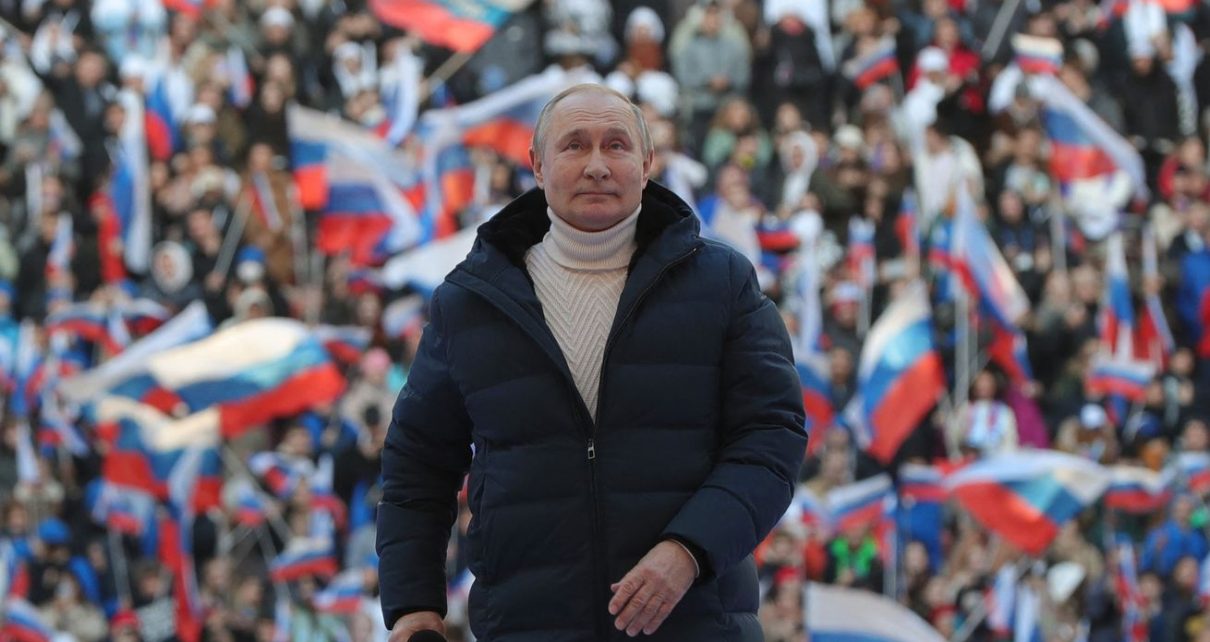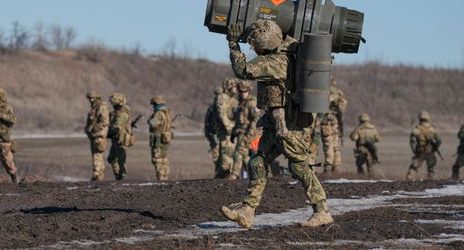
What Putin’s ever-shrinking world means for the war in Ukraine.
Russian President Vladimir Putin is isolated — and getting more so. President Joe Biden calls him a war criminal. American intelligence says Putin’s own advisers are misleading him about the war, telling Putin what he wants to hear. So what’s going through this secretive, solitary dictator’s mind? We’ve found one man who thinks he knows the answer.
Journalist and author Marvin Kalb has loved Russia for almost 70 years. In the early 1950s, he studied Russian history as a PhD candidate at Harvard. In 1960, he moved to Moscow as a reporter for CBS News. He’s interviewed many powerful Russians. But he’s never talked to Vladimir Putin. To get insight into Putin, Kalb says, it’s better to read about him than to interview him.
For an episode of Today, Explained, host Noel King talked with Kalb about how Putin has come to rely on a skewed version of history and an increasingly small circle of advisers — and what that means for the war in Ukraine. A partial transcript of their conversation, edited for length and clarity, is below.
Marvin Kalb
I have found over the years that if you read intensely what a leader says or writes or thinks about himself, you’re going to get a pretty good idea of what he actually is. Sometimes in an interview, you get only what a major political figure wishes to convey. And he does that very well. Putin is an astoundingly good interview. And reporters who get interviews with him do very well because he can play to the personality. He knows how to deal with people. That’s terribly important to him.
Noel King
Based on your many years of reading and observing, and knowing that you have a keen sense into who people are, who is Vladimir Putin?
Marvin Kalb
Vladimir Putin at the moment is a very lonely figure. He is finally a dictator. He used to be an authoritarian figure. He used to have the kind of power that a czar had. He is now an absolute dictator. And for him, that’s a bad thing.
What it means is, on the one hand, he has absolute power to do whatever he wants in Russia. But the people around him are now terrified of him. And that means that they will tell him what they think he wants to hear. That is very bad for any leader of any country. Putin now is in desperate need of solid, 100 percent verified information, and he is not getting it. That is the belief of the US government, of Western nations, and I think, logically, given the history of dictatorship, that when you get to an absolute top point of power, you begin to lose it. And Putin now is in the process of losing the power that for most of his life, he sought to accumulate.
He is a former KGB official. One of the young men in the dying days of the Soviet Union who would try to live in the artificial world created by the KGB. He would imagine what the Western world was like. He would try very hard to understand it. He would pick up a language. The government gave him every opportunity to learn as much about the enemy as he could, and he did, and he thought he would be able to figure out how to manipulate the enemy so that he could destroy it. That was the whole point of the KGB operation. It was an intelligence unit, but it was also a unit that operated to achieve certain ends. And for the KGB, the end has always been the dissolution of the Western threat.
Noel King
We know that US intelligence has tried to assess whether the pandemic changed Vladimir Putin’s mental state, whether isolation from the pandemic changed him. Was he a solitary person before the pandemic?
Marvin Kalb
Every leader is, to some degree, a lonely figure, but Putin was not. Putin enjoyed being with people, but at the same time, he was always very suspicious of everybody. And so there was always a distance between him and anyone he was negotiating with. And certainly between him and a person he would regard as an enemy, and so, yes, distance existed. He was surrounded always by his own intelligence, his own ambition, his drive for power. And when he achieved that, he was very good at persuading the man above him, the president of Russia, [Boris] Yeltsin. In the 1990s, Yeltsin brought him down from St. Petersburg to Moscow and Yeltsin appointed Putin the head of the KGB, or the new version of it. And a couple of years later appointed him prime minister. And then when Yeltsin wanted to resign, he looked around and the only person he felt he could trust was Putin.
So Putin became his successor, and almost immediately established a new kind of governance in Russia. He had his KGB folks ready to roll into power not only in Moscow and St. Petersburg, but all over the country. It is a vast country. It extends over many time zones. It is difficult to run a country that large and Putin had his people in position to run it, he had control over the entire operation. He became the boss.
Noel King
And so who surrounds Putin now? Who are his advisers? Who are his friends?
Marvin Kalb
The people who are around him now are the same people, more or less, who’ve been around him for the past 22 years. They are the people from the KGB. He allowed those people to take control over large economic assets in the country. Oil, gas, timber, invested in the hands of a very small group, and this small group proved to be effective enough for Putin to become the boss and run this very complex society.
Noel King
What does it tell you that Vladimir Putin has not made new friends over the last 22 years? That the same people who surrounded him when he was a KGB agent surround him as he is president of a world power?
Marvin Kalb
And that is an extremely important observation, because what we learn from it is that we are dealing with a man who had a certain vision of the world 20-30 years ago and retains it only in sharper form today.
Please remember, Putin is first and foremost a Russian nationalist. The question that comes into mind: is he an ultra-nationalist? By which, I mean, does he see everything from a Russian point of view? And the answer, unfortunately, is yes. And because he sees everything from a Russian point of view, he looks at a country, for example, like Belarus; at Ukraine; they are both Slavic. They are both Orthodox in religion and therefore in his mind, they are Russian. And it is not understandable to him at all that people who are authentically Russian, as he sees it, could ever be in rebellion against Moscow. In his mind, they have to be part of Moscow.
So we can look now at the war in Ukraine and say, “Isn’t it marvelous?” and indeed it is, that democracy appears to be holding on in Ukraine. For Putin, that is heresy. That is blasphemy. That is unacceptable. And so he will continue to fight to achieve the realization of what to him is perfectly normal.
Noel King
At this point, it has become very clear, in both reporting from on the ground and in reporting from the US Pentagon, Vladimir Putin is not winning the war in Ukraine. It seems as though it’s too early to say he’s losing it. What does that do for his mental state, do you think?
Marvin Kalb
Oh, I think it’s a shattering experience. That does not mean it totally undermines him. He’s a strong man and he’s very smart. He’s cunning, in fact. There’s a Russian word, хитрый, which means cunning, in a street corner sense. He understands power and he understands the utilization of power. He has very little patience for intelligence that comes to him saying, “We’re killing too many people.” Forget all of that. Where are we in terms of the end that I have articulated as our policy goal?
In fact, his policy goal, now, is never going to happen. He thought the war would be over within two or three days. We’re now into a second month and it may go on much longer than this. I hope not, but it’s possible. And in his mind, he is pursuing a legitimate historical goal. And can he lose? No. Can he persuade himself, ever, that he has lost? No. The only people who can persuade him will never persuade him, they will have to get rid of him in one way or another. And those are the people closest to him. They are the ones who know his mind, know his methods because they are the same people.
And if they get rid of him, there may be somebody very much like him who would come into power, or if we are lucky … if we are lucky, we may get to see the other promise of Russia … of literature, of music, of history, of growth, of creativity — Russia and the Russian people, it’s a great society.
And if there were another way of leaving the KGB mentality and reaching into the other Russia, we would all be so much better off led by the Russian people themselves. Is it possible? Yes. It’s there. It has to emerge from the soot and the gutter that it exists in today.
Listen to the full episode of Today, Explained wherever you get podcasts, including Apple Podcasts, Spotify, Google Podcasts, and Stitcher.



